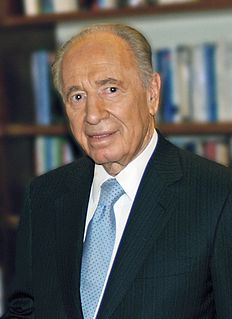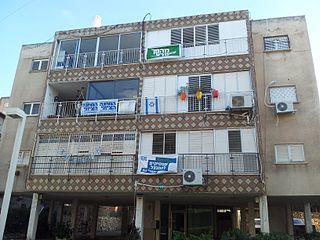United Torah Judaism is an alliance of Degel HaTorah and Agudat Israel, two Ashkenazi Haredi (ultra-Orthodox) political parties in the Israeli Knesset. It was first formed in 1992.

Shas is an ultra-Orthodox religious political party in Israel. Founded in 1984 under the leadership of Rabbi Ovadia Yosef, a former Israeli Sephardi chief rabbi, who remained its spiritual leader until his death in October 2013, it primarily represents the interests of Haredi Sephardic and Mizrahi Jews. The party works to end prejudice and discrimination against the Sephardic community, and highlights economic issues and social justice.
Shinui was a Zionist, secular, and anti-clerical free market liberal party and political movement in Israel. The party twice became the third-largest in the Knesset, but both occasions were followed by a split and collapse; in 1977, the party won 15 seats as part of the Democratic Movement for Change, but the alliance split in 1978, and Shinui was reduced to two seats at the next elections. In 2003, the party won 15 seats alone, but lost them all three years later after most of its MKs left to form new parties. The party was a member of Liberal International until 2009.

Yossi Sarid was an Israeli politician and news commentator. He served as a member of the Knesset for the Alignment, Ratz and Meretz between 1974 and 2006. A former Minister of Education and Minister of the Environment, he led Meretz between 1996 and 2003 and served as Leader of the Opposition from 2001 to 2003. Known for his determined moral stance and his willingness to pay the political price for that determination, Sarid was often referred to as Israel's moral compass.
Elections for the 16th Knesset were held in Israel on 28 January 2003. The result was a resounding victory for Ariel Sharon's Likud.

Early general elections for both the Prime Minister and the Knesset were held in Israel on 17 May 1999 following a vote of no confidence in the government; the incumbent Likud Prime Minister Benjamin Netanyahu, ran for re-election.
Legislative elections were held in Israel on 17 May 1977 to elect the ninth Knesset. For the first time in Israeli political history, the right-wing, led by Likud, won a plurality of seats, ending almost 30 years of rule by the left-wing Alignment and its predecessor, Mapai. The dramatic shift in Israeli politics caused by the outcome led to it becoming known as "the revolution", a phrase coined by TV anchor Haim Yavin when he announced the election results live on television with the words "Ladies and gentlemen—a revolution!". The election saw the beginning of a period lasting almost two decades where the left- and right-wing blocs held roughly equal numbers of seats in the Knesset.

The Alignment is the name of two political alliances in Israel. Each of these Alignment parties later merged into what is now the Israeli Labor Party.
Elections for the eleventh Knesset were held in Israel on 23 July 1984. Voter turnout was 78.8%. The results saw the Alignment return to being the largest party in the Knesset, a status it had lost in 1977. However, the party could not form a government with any of the smaller parties, resulting in a national unity government with Likud, with both party leaders, Shimon Peres and Yitzhak Shamir, holding the post of Prime Minister for two years each.
Elections for the 12th Knesset were held in Israel on 1 November 1988. Voter turnout was 79.7%.

General elections were held in Israel on 29 May 1996. For the first time the prime minister was elected on a separate ballot from the remaining members of the Knesset.
The dirty trick refers to a political scandal that erupted in Israel in 1990. It referred to an attempt by Shimon Peres to form a minority government made up of the left-wing factions and the ultra-orthodox parties. It failed when the ultra-orthodox parties backed out on the deal.

Elections for the 18th Knesset were held in Israel on 10 February 2009. These elections became necessary due to the resignation of Prime Minister Ehud Olmert as leader of the Kadima party, and the failure of his successor, Tzipi Livni, to form a coalition government. Had Olmert remained in office or had Livni formed a coalition government, the elections would have been scheduled for 2010 instead.

The twenty-fourth government of Israel was formed by Yitzhak Shamir of Likud on 11 June 1990. This followed the failure of Alignment leader Shimon Peres to form a government, after the Alignment had pulled out of the previous national unity coalition, in an incident which became known as the dirty trick.

The twenty-fifth government of Israel was formed by Yitzhak Rabin of the Labor Party on 13 July 1992, after the party's victory in the June elections. The coalition also contained the new Meretz party and Shas, and held 62 of the 120 seats in the Knesset. The government was also supported, but not joined, by Hadash and the Arab Democratic Party, which held an additional five seats between them.

The twenty-sixth government of Israel was formed by Shimon Peres of the Labor Party on 22 November 1995, following the assassination of Yitzhak Rabin on 4 November. Peres kept the same coalition as previously, namely the Labor Party, Meretz and Yiud, which together held only 58 of the 120 seats in the Knesset. However, they government was also supported, but not joined, by Hadash and the Arab Democratic Party, which held an additional five seats between them.

The twenty-ninth government of Israel was formed by Ariel Sharon on 7 March 2001, following his victory over Ehud Barak in the special election for Prime Minister in February. It was the first, and to date only time an election for Prime Minister was held without parallel elections for the Knesset, and one of the first acts of the new government was to repeal the law which introduced separate elections. Despite his large margin of victory in the election, because there had been no Knesset elections, Sharon's Likud was not the largest party in the Knesset, resulting in the formation of a national unity coalition that at some point included Labor-Meimad, Shas, the Centre Party, the National Religious Party, United Torah Judaism, Yisrael BaAliyah, the National Union-Yisrael Beiteinu, the New Way and Gesher. Shas left the government on 23 May 2002, but returned on 3 June, whilst Labor-Meimad left on 2 November 2002.
Early elections for the nineteenth Knesset were held in Israel on 22 January 2013. Public debate over the Tal Law had nearly led to early elections in 2012, but they were aborted at the last moment after Kadima briefly joined the government. The elections were later called in early October 2012 after failure to agree on the budget for the 2013 fiscal year.

Early elections for the twentieth Knesset were held in Israel on 17 March 2015. Disagreements within the governing coalition, particularly over the budget and a "Jewish state" proposal, led to the dissolution of the government in December 2014. The Labor Party and Hatnuah formed a coalition, called Zionist Union, with the hope of defeating the Likud party, which had led the previous governing coalition along with Yisrael Beiteinu, Yesh Atid, The Jewish Home and Hatnuah.

Meretz is a left-wing social-democratic and green political party in Israel.
















